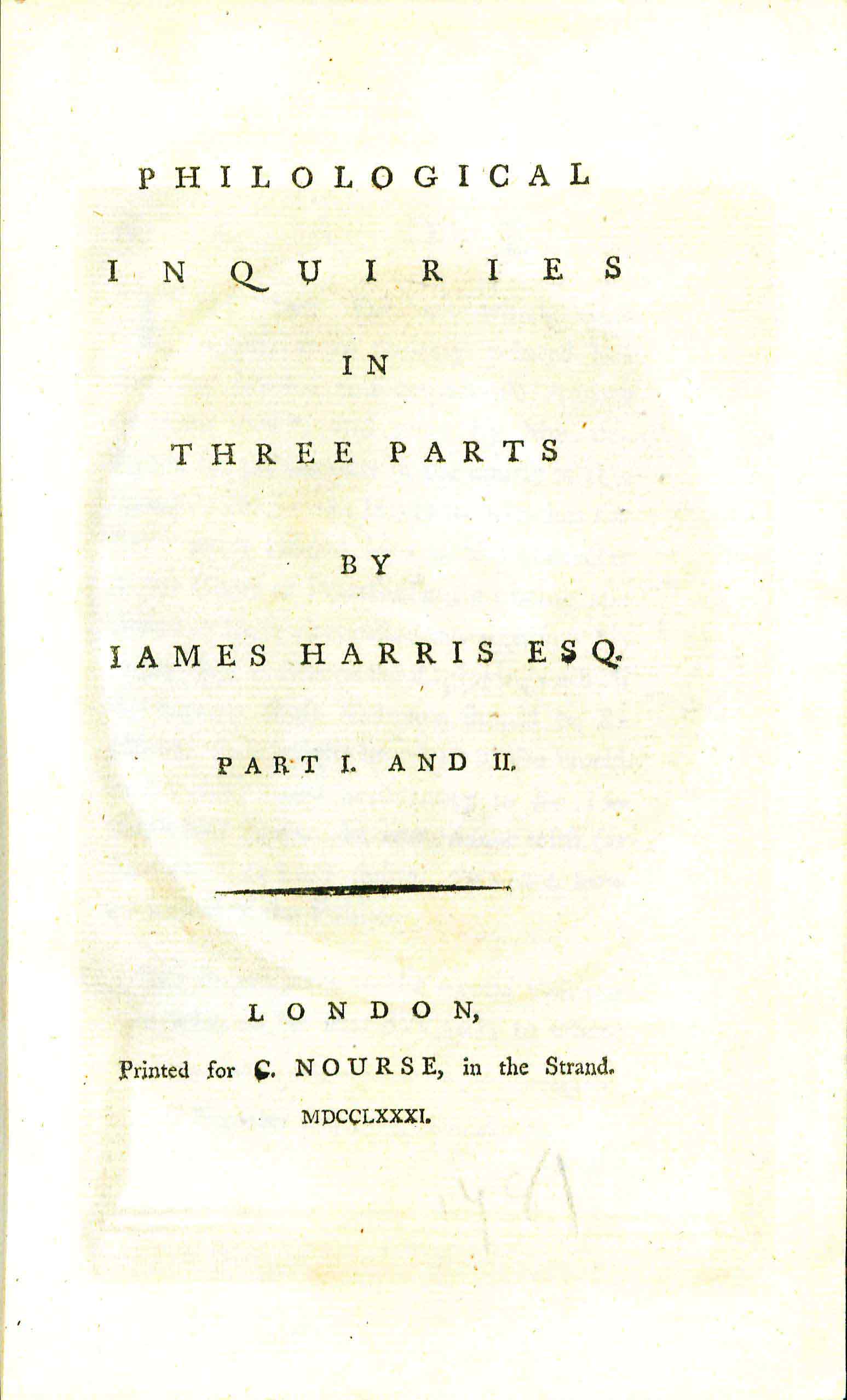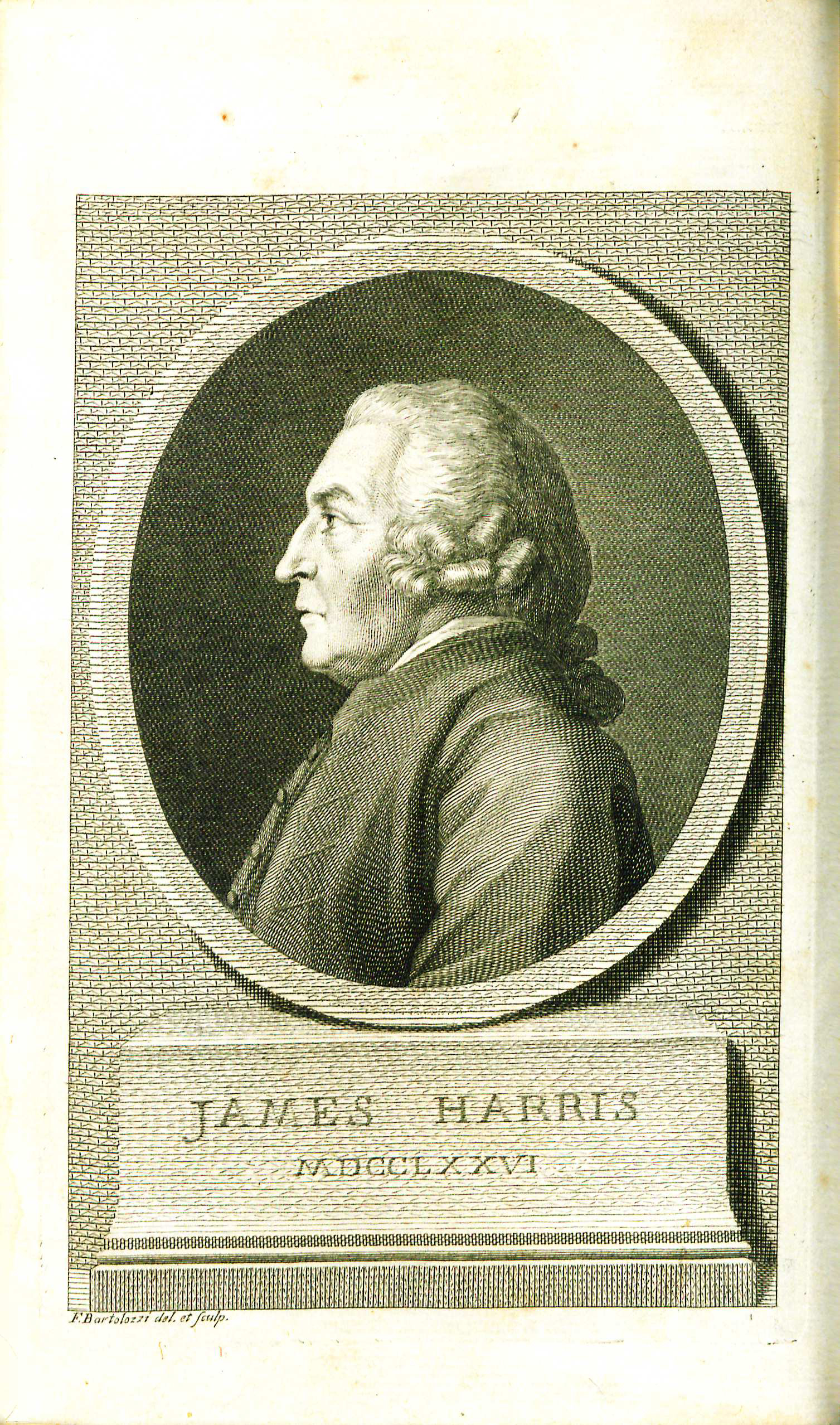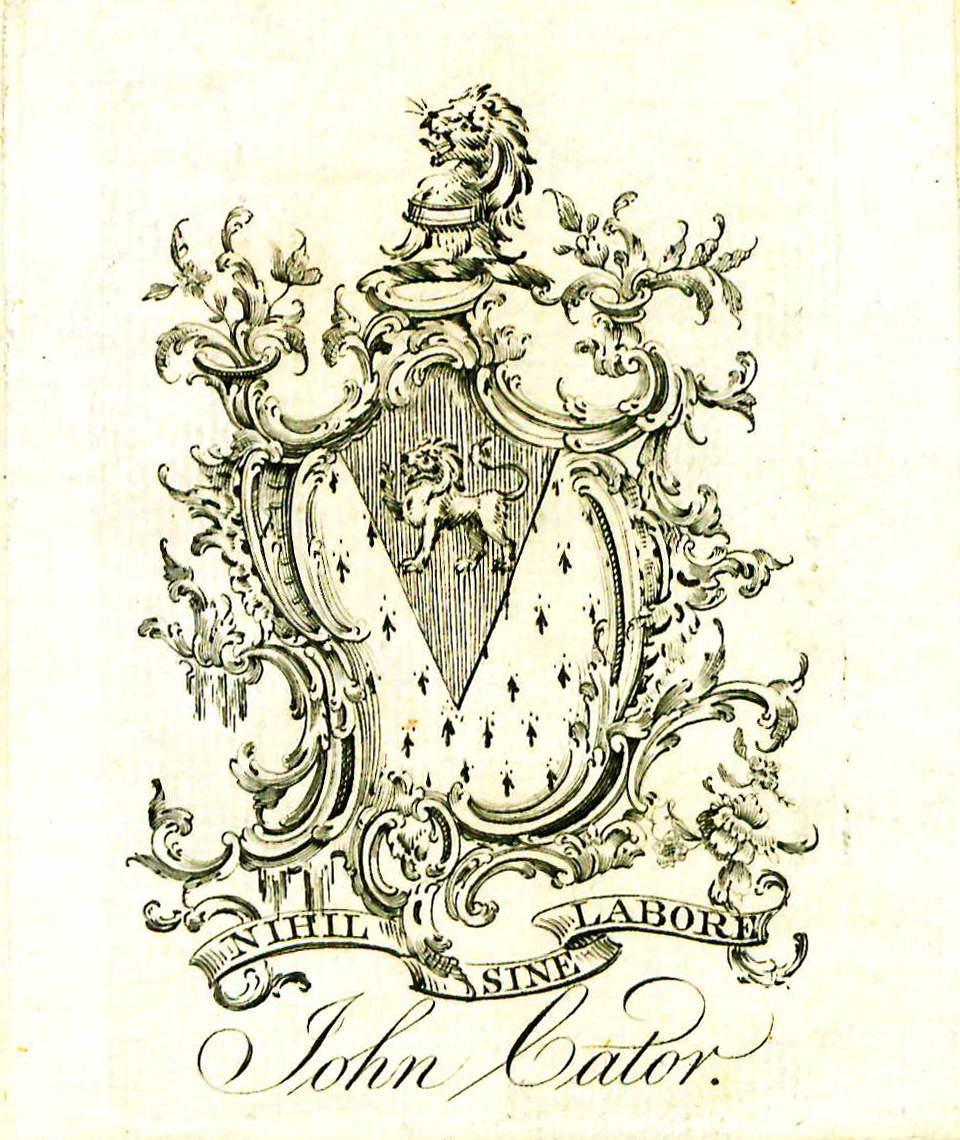Difference between revisions of "Philological Inquiries"
m |
|||
| (3 intermediate revisions by 3 users not shown) | |||
| Line 3: | Line 3: | ||
{{BookPageInfoBox | {{BookPageInfoBox | ||
|imagename=HarrisPhilologicalInquiries1781v1and2.jpg | |imagename=HarrisPhilologicalInquiries1781v1and2.jpg | ||
| − | |link=https:// | + | |link=https://wm.primo.exlibrisgroup.com/permalink/01COWM_INST/g9pr7p/alma991017618249703196 |
|shorttitle=Philological Inquiries In Three Parts | |shorttitle=Philological Inquiries In Three Parts | ||
|vol=two volumes bound as one | |vol=two volumes bound as one | ||
| − | |author=James Harris | + | |author=[[:Category:James Harris|James Harris]] |
| − | |publoc=London | + | |publoc=[[:Category:London|London]] |
|publisher=Printed for C. Nourse | |publisher=Printed for C. Nourse | ||
|year=1781 | |year=1781 | ||
| − | |lang=English | + | |lang=[[:Category:English|English]] |
|set=2 volumes (3 parts) in 1 | |set=2 volumes (3 parts) in 1 | ||
| − | |desc=8vo (23 cm.) | + | |desc=[[:Category:Octavos|8vo]] (23 cm.) |
|shelf=H-1 | |shelf=H-1 | ||
}}[[File:HarrisPhilologicalInquiries1781Frontispiece.jpg|left|thumb|250px|<center>Frontispiece.</center>]][[wikipedia:James Harris (grammarian)|James Harris]] (1709 – 1780), an English philosopher, grammarian, and music patron, attended both [[wikipedia:Wadham College, Oxford|Wadham College]] and [[wikipedia:Lincoln's Inn|Lincoln's Inn]], but graduated from neither.<ref>Rosemary Dunhill, "[http://www.oxforddnb.com/view/article/12393 Harris, James (1709–1780)]" in ''Oxford Dictionary of National Biography'', accessed October 18, 2013.</ref> He and his wife Elizabeth had five children, but only three of them lived past infancy.<ref>Ibid.</ref> Harris was a great admirer of [[wikipedia:George Frideric Handel|Handel's]], and even wrote a first draft of one of the composer's librettos, ''L'allegro, il penseroso ed il moderato''.<ref>Ibid.</ref> Harris served as a member of parliament for Christchurch, as commissioner of admiralty and, eventually, as secretary and comptroller for [[wikipedia:Charlotte of Mecklenburg-Strelitz|Queen Charlotte]].<ref>Ibid.</ref> Harris had close royal ties, was elected as a fellow to the [[wikipedia: Royal Society| Royal Society]], and held a Trustee position in the British Museum for the fifteen years leading up to his death in 1780.<ref>Ibid.</ref> | }}[[File:HarrisPhilologicalInquiries1781Frontispiece.jpg|left|thumb|250px|<center>Frontispiece.</center>]][[wikipedia:James Harris (grammarian)|James Harris]] (1709 – 1780), an English philosopher, grammarian, and music patron, attended both [[wikipedia:Wadham College, Oxford|Wadham College]] and [[wikipedia:Lincoln's Inn|Lincoln's Inn]], but graduated from neither.<ref>Rosemary Dunhill, "[http://www.oxforddnb.com/view/article/12393 Harris, James (1709–1780)]" in ''Oxford Dictionary of National Biography'', accessed October 18, 2013.</ref> He and his wife Elizabeth had five children, but only three of them lived past infancy.<ref>Ibid.</ref> Harris was a great admirer of [[wikipedia:George Frideric Handel|Handel's]], and even wrote a first draft of one of the composer's librettos, ''L'allegro, il penseroso ed il moderato''.<ref>Ibid.</ref> Harris served as a member of parliament for Christchurch, as commissioner of admiralty and, eventually, as secretary and comptroller for [[wikipedia:Charlotte of Mecklenburg-Strelitz|Queen Charlotte]].<ref>Ibid.</ref> Harris had close royal ties, was elected as a fellow to the [[wikipedia: Royal Society| Royal Society]], and held a Trustee position in the British Museum for the fifteen years leading up to his death in 1780.<ref>Ibid.</ref> | ||
| − | Harris also wrote ''[[Hermes | + | Harris also wrote ''[[Hermes, or, A Philosophical Inquiry Concerning Universal Grammar]],'' a scientific theory of Greek, Latin, and modern grammar used by [[Henry Clay]], and thought to have belonged to Wythe. Although his writings are unfamiliar to many today, with ''Philological Inquiries,'' Harris made a significant contribution to historical linguistics, and was held with some regard among his contemporaries.<ref>Clive T. Probyn, "Johnson, James Harris, and the Logic of Happiness," ''The Modern Language Review '' 73, no. 2 (Modern Humanities Research Association, April 1978): 256-266.</ref> |
==Evidence for Inclusion in Wythe's Library== | ==Evidence for Inclusion in Wythe's Library== | ||
| Line 28: | Line 28: | ||
}}Bound in contemporary tree calf with spine divided in gilt compartments with gilt lozenges and lettering. Includes the bookplate of John Cator with the Latin motto "Nihil sine labore" (Without labor, nothing) on the front pastedown. Purchased from Am Here Books. | }}Bound in contemporary tree calf with spine divided in gilt compartments with gilt lozenges and lettering. Includes the bookplate of John Cator with the Latin motto "Nihil sine labore" (Without labor, nothing) on the front pastedown. Purchased from Am Here Books. | ||
| − | Images of the library's copy of this book are [https://www.flickr.com/photos/wolflawlibrary/sets/72157659431107500 available on Flickr.] View the record for this book in [https:// | + | Images of the library's copy of this book are [https://www.flickr.com/photos/wolflawlibrary/sets/72157659431107500 available on Flickr.] View the record for this book in [https://wm.primo.exlibrisgroup.com/permalink/01COWM_INST/g9pr7p/alma991017618249703196 William & Mary's online catalog]. |
==See also== | ==See also== | ||
<div style="overflow: hidden;"> | <div style="overflow: hidden;"> | ||
*[[George Wythe Room]] | *[[George Wythe Room]] | ||
| − | *''[[Hermes | + | *''[[Hermes, or, A Philosophical Inquiry Concerning Universal Grammar]]'' |
*[[Jefferson Inventory]] | *[[Jefferson Inventory]] | ||
*[[Wythe's Library]] | *[[Wythe's Library]] | ||
| Line 48: | Line 48: | ||
[[Category:George Wythe Collection at William & Mary's Wolf Law Library]] | [[Category:George Wythe Collection at William & Mary's Wolf Law Library]] | ||
| + | [[Category:James Harris]] | ||
[[Category:Jefferson's Books]] | [[Category:Jefferson's Books]] | ||
[[Category:Language and Rhetoric]] | [[Category:Language and Rhetoric]] | ||
| Line 53: | Line 54: | ||
__NOTOC__ | __NOTOC__ | ||
| + | [[Category:English]] | ||
| + | [[Category:London]] | ||
| + | [[Category:Octavos]] | ||
Latest revision as of 15:49, 25 October 2021
by James Harris
| Philological Inquiries In Three Parts | |
|
Title page from Philological Inquiries In Three Parts, two volumes bound as one, George Wythe Collection, Wolf Law Library, College of William & Mary. | |
| Author | James Harris |
| Published | London: Printed for C. Nourse |
| Date | 1781 |
| Language | English |
| Volumes | 2 volumes (3 parts) in 1 volume set |
| Desc. | 8vo (23 cm.) |
| Location | Shelf H-1 |
Harris also wrote Hermes, or, A Philosophical Inquiry Concerning Universal Grammar, a scientific theory of Greek, Latin, and modern grammar used by Henry Clay, and thought to have belonged to Wythe. Although his writings are unfamiliar to many today, with Philological Inquiries, Harris made a significant contribution to historical linguistics, and was held with some regard among his contemporaries.[6]
Evidence for Inclusion in Wythe's Library
Listed in the Jefferson Inventory of Wythe's Library as "Harris's Philological enquiries. 8vo." This was one of the titles kept by Thomas Jefferson. Jefferson later sold a copy to the Library of Congress in 1815, but the volume no longer exists to verify Wythe's prior ownership.[7] Both George Wythe's Library[8] on LibraryThing and the Brown Bibliography[9] list the first (1781) edition (we don't know if there were others). The Wolf Law Library followed their recommendations and purchased a copy of the first edition for the George Wythe Collection.
Description of the Wolf Law Library's copy
Bound in contemporary tree calf with spine divided in gilt compartments with gilt lozenges and lettering. Includes the bookplate of John Cator with the Latin motto "Nihil sine labore" (Without labor, nothing) on the front pastedown. Purchased from Am Here Books.
Images of the library's copy of this book are available on Flickr. View the record for this book in William & Mary's online catalog.
See also
References
External Links
Read parts one and two of this book in Google Books.
Read part three of this book in Google Books.


